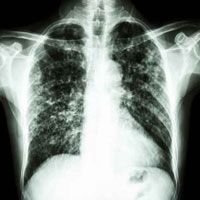Article
Lungs' Counter-infection Measures Highlighted
Author(s):
A fairly unknown protein called the short palate, lung and nasal epithelial clone 1 (SPLUNC1), was found to attach to key lipids responsible for combating bacterial and viral infections, while keeping lung tissue hydrated - a discovery that highlighted breakthrough antibacterial routes.

A fairly unknown protein called the short palate, lung and nasal epithelial clone 1 (SPLUNC1), was found to attach to key lipids responsible for combatting bacterial and viral infections, while keeping lung tissue hydrated —a discovery that highlighted breakthrough antibacterial routes.
By overexpressing and crystallizing SPLUNC1 proteins, the study, published in the Federation of American Societies for Experimental Biology (FASEB) Journal, detailed the antimicrobial’s structure and function. Specifically, researchers discovered startling differences between SPLUNC1 and the bactericidal/permeability-increasing protein (BPI), another antibacterial protein that attached to foreign bodies.
“These discoveries provide insight into the specific determinants governing the interaction between SPLUNC1 and lipids and also shed light on novel functions that SPLUNC1 and other PLUNC family members perform in host defense,” the writers penned.
.
Moreover, the investigators called attention to key interactions between SPLUNC1 and dipalmitoylphosphatidylcholine (DPPC), a phospholipid tasked with keeping lung airways open.
“One of the major and most important pulmonary surfactant phospholipids, DPPC, bound to SPLUNC1 with high affinity and specificity,” the authors reported. “We found that SPLUNC1 could be the first protein receptor for DPPC."
Touting their discovery, FAESB Editor-in-chief, Gerald Weissmann, MD, believed their report offered perspective about effective treatments for infections such as methicillin-resistant Staphylococcus aureus (MRSA) and Pseudomonas.
"We anticipate that our study will bring us closer to transforming SPLUNC1 into a promising therapeutic option to help asthma and Chronic Obstructive Pulmonary Disease (COPD) patients clear bacterial and viral infections from the airway,” commented co-contributor Gongyi Zhang, PhD, of the Department of Biomedical Research at National Jewish Health.





